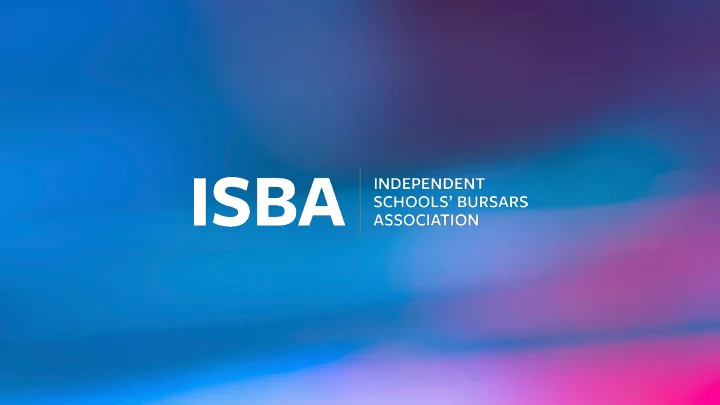

Teachers’ Pensions: Background, Options and Emerging Issues Bishop’s Stortford College John Murphie Chief Operating Officer, ISBA 17 June 2019
What is the Teachers’ Pension Scheme? • Unfunded, government run public sector scheme • Currently no exit penalty for schools • Open to state school teachers, university lecturers and independent school teachers • Reviewed every four years to ensure its assets and performance remain within parameters set by the Treasury • Independent schools contribute about £700m per year currently • This would be c.£840m if all schools remain in TPS and pay 23.68% contributions • The current service cost of providing TPS pensions is not going to be met by the new rate (Page 20 TPS Accounts 2017-18) Are future rises inevitable? Government is flagging this •
The problem: • Employer Contributions up 43% from September 2019 (from 16.48% to 23.68%) • Unaffordable, Unsustainable, Unviable in schools in some schools in all associations • ISC/ISBA challenge HMT, the Chancellor, DfE • Cannot close scheme to new teachers – all in/all out: the “Mixed Economy”? Timing? • A new scheme (APTIS) is available for September (Defined Contribution) • ISBA’s position is clear • Governing bodies must make their own decisions to remain/opt out and will need to balance • Impact on morale/recruitment/retention of teachers • Affordability/duties as trustees and directors • Risks of future increases/liabilities: speculation vs prudent risk management • The Unions’ stance
ISBA’s Position • TPS is a very good defined benefit pension scheme • In an idea world, schools would not withdraw • However a 43% increase in employer contributions may be unaffordable for (many) schools • In which case there are two options (subject to consultation): to leave TPS and use APTIS • to do something else such as “reversing into” existing defined contribution schemes for support staff • • Schools are consulting; schools have joined APTIS already • Others are taking a “wait and see” stance and taking time to consider options and plan • Is the “Mixed Economy” a solution?
Uncertainties and Context • Affordability/pressure on fees/upward pressure on the cost base • Political and economic drivers for change • Levies • VAT on school fees • Loss of mandatory business rates relief • Further TPS increases • Brexit • Loss of charitable status • Parental choice and confidence • Options? Doing nothing is not an option!
Questions for Boards re TPS: 1. Can we afford a 43% increase in employer contributions? 2. Can we future-proof against risk of future rises? (What if it is 30% in 4 years?) 3. Even if 23.68% is affordable now, what will the impact of further financial shocks be e.g. loss of MBRR? 4. Will we breach bank covenants? Going concern issues? 5. Is this proper use of charitable funds? 6. What will parent reaction be? 7. Should we leave TPS now along with other schools and whilst there are no exit penalties? 8. What will the impact be on teacher recruitment, retention, morale and industrial relations? 9. What should our future remuneration strategy be?
Options (1) Option 1 – Pass the cost on as a fee increase – by up to 2.6% before any other inflationary increase. Option 2 - Maintain the current cost of teaching staff • Increase Pupil:Teacher Ratio. • Increase number of pupils • Reduce teacher headcount • Pay freeze – hold teachers’ pay for a couple of years at least a year on the basis that their ‘benefits’ would have been increased by 6%. • Review teacher employment (Are teachers employed for roles that could be carried out by others e.g. coaching, library, management, etc?) • Review structure of school, including setting, to have a smaller number of full classes than a larger number of classes with empty seats.
Options (2) Option 3 - Reduce other costs, as an example remove teaching staff fee discounts/means test staff remissions Option 4 - Accept a lower surplus of, say, 5% and in turn trim expectations about reinvestment. Option 5 – Address the core issue – the cost of exposure to an unfunded public sector pension scheme and the mechanism required to withdraw the school from it. Option 6 – This will be a catalyst for change so, merge with another school, or schools, acquire another school or schools, join a Group, seek investors?
Summary • TPS is an unfunded scheme that will not make good its deficit using this increase in contributions • There are no TPS exit penalties currently • There are other strategic financial threats to consider • Which should be balanced against recruitment, retention, morale of staff • Other pensions schemes are available including APTIS • The risk shifts in a DC scheme to the employee from the employer • A DC scheme and salary sacrifice gives flexibility to school employees • ISBA has provided the full details of APTIS and death in service/critical illness cover • Legal issues (and other questions) are being answered as they arise • ISBA will support schools through the necessary HR and other processes Beware of inducements • It is for Boards of Governors to decide • Will this be a catalyst for change in remuneration policies (and more widely in stimulating
Recommend
More recommend